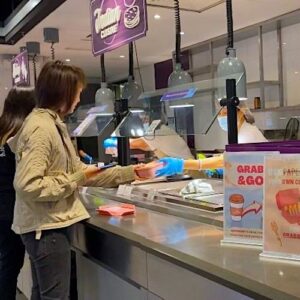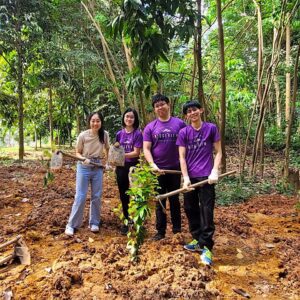Sustainability @ RVRC
Sustainability is woven through the very fabric of RVRC, starting from the physical environment to our academic programme and beyond. RVRC is the only college in NUS that features a Bioswale and an EcoPond. Most of the RVRC Courses are also pegged to the UN Sustainable Development Goals and address various aspects of sustainability. Beyond the academic curriculum, a range of student-led Interest Groups are centred on the theme and engage students in talks and actions on sustainability.
Sustainability in RVRC Courses
The RVRC Programme aims to familiarise students with the three pillars of sustainability, namely economic, environmental, and social and address the UN Sustainable Development Goals (SDG). As such most courses have the theme of sustainability woven through their syllabus. This often brings students on field trips to observe and assess sustainability issues, engage with sustainable business through industry visits, or work with a community partner on sustainability-centric projects. As such students engage with the NUS Office of Environmental Sustainability, NGOs working on gender equality or conservation issues, such as AWARE, SWAG, and Nature Society Singapore (NSS). Many courses also actively engage students to address sustainability issues through final projects that are aimed to address real-life problems. Working with community and industry partners students are able to take these modules beyond the classroom and execute their implementation.
To find out more about the RVRC Courses and their connection to sustainability please click here
Sustainability in Outdoor Learning
Sustainability is at the heart of the RVRC outdoor education programme, which has a strong emphasis on environmental stewardship. The extracurricular outdoor education initiatives connect students with nature and culture in Singapore and abroad. A strong focus is placed on physical participation and hands-on activities, to engage students beyond the classroom. We strongly encourage all RVRC students to be curious and to be open to new experiences, be it through the Kayak & Clean initiatives, the RVRC Leopard Cat Quest night walks in Pulau Ubin, reforestation projects in Chestnut Nature Park, Mangrove and Coastal Cleanups in Sungei Buloh Wetland Reserve, or any other programme offered.
To find learn more about the RVRC Outdoor Learning programmes that engage students in sustainability click here
Sustainability in RVRC Interest Groups
The RVRC interest group Green Rangers connects students to nature through gardening and environmental activities, such as mangrove and coastal clean-ups. RV Climate Café is an interest group that aims to raise awareness of environmental issues while countering eco-anxiety. The interest group RV FoRestore brings together a community that cares for the forests and aims to raise awareness and appreciation of Singapore’s forests through hands-on activities, such as surveys and reforestation projects.
To find out more about the RVRC Interest Groups activities centred around sustainability click here
Sustainability in RVRC Student Projects
With RVRC students working with external partners, we aim to be true to our motto The World is Our Classroom by empowering students to implement their project proposals. Some of the student proposals have garnered the interest of the chosen partners and have been successfully executed.
Successful Implementation of Student Projects

RVN2000 Project: No Box No Go
Arista Ho Zhen, Eliza Lim Siew Ping Yi, Hor Kia Wei, and Javier Chia Yi Xian
Our inspiration for eliminating waste packaging in RVRC came during the rubbish sorting activity for our RVN2000 field trip. As we sorted the rubbish produced by RV residents into different categories such as food waste, e-waste, and plastic waste, we noticed that the Grab-and-Go stall in the Dining Hall was producing an excessive amount of single-use disposables. We realised that this was in direct contradiction to the ethos of RVRC as a sustainable community. After being aware of the impact the amount of waste was having on the environment and our community, we proposed to eliminate packaging waste generated by the Grab-and-Go stall. This would not only reduce the volume of single-use disposables in RVRC, but also align with NUS Zero Waste's goal of eliminating single-use disposables by 2025. We believed that this project was feasible and could be implemented in RVRC as long as we remained that the ability to change and contribute to our community does not have to be a top-down approach but from ourselves as students.

RVN2001 Project: Rewilding Yishun Park
Soh Yong Xian Dan, Lo Mei Hui, Yeoh Jun Ting, Heng Chin Yee, Sarah, and Brian Chow Wei Xuan
As part of our RVN2001: The Great Extinction: conservation and rewilding course’s final project, we proposed a rewilding plan for an under-utilised site in Yishun Park. We determined that the site – a small, sheltered area at the fringe of Yishun Park’s forest with spaced-out trees but no undergrowth – could be rewilded to extend the forest fringe outwards as a forest buffer zone. We decided on the strategy of deliberate rewilding: planting trees and shrubs, due to its shorter implementation timeframe. As part of our proposal, we researched on the benefits of rewilding as a buffer zone, and provided a justification of benefits to relevant stakeholders should the proposal be implemented. The proposal was then pitched to NParks, as well as MP Louis Ng of Nee Soon GRC with the backing of RVRC and Nature Society Singapore. After initial meetings with NParks at Yishun Park and understanding various factors about the site, we came to an agreement with NParks for our project to be registered under the Youth Stewards for Nature 2023 programme, which made our project official. In our implementation, we conducted site surveys to document resident fauna, planned and executed a tree planting event with RVRC student volunteers. We aim to observe an increase in resident fauna in the site in future site surveys after the tree planting event, so that our project can be considered a success.

